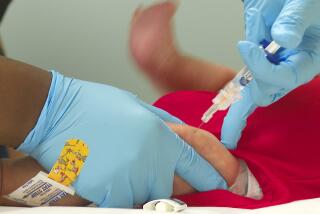PUBLIC HEALTH : Childhood Diseases Rebound as Vaccine Program Costs Soar
WASHINGTON — Vaccine-preventable childhood diseases, once thought to be on the verge of eradication, are now in an upsurge that has public health officials and others worried.
“We cannot allow children to die of diseases that should never occur,” said Rep. Henry A. Waxman (D-Los Angeles), chairman of the House Energy and Commerce subcommittee on health, which has held several hearings on the problem. “And we cannot afford to treat children for crippling conditions that we can prevent.”
The biggest problem is not that federal funding for child immunizations has been cut as other domestic programs have, but that costs have soared and the money available has lost its previous purchasing power.
Some of the statistics are ominous. In 1983, for example, there were 1,497 cases of measles nationwide. By 1989, the toll had reached 18,193, according to the Robert Wood Johnson Foundation, a major health care philanthropy. In 1990, cases of measles reached a high of 27,786. Los Angeles, Chicago and Houston accounted for one-third of the cases.
By the middle of 1991, the numbers had decreased to fewer than 10,000 cases--but the epidemic continues to rage in some cities. In New York City, for example, measles cases more than doubled between 1990 and 1991.
The United States ranks 56th worldwide in immunizing minority children against childhood diseases, and 17th in vaccinating all children against these illnesses, the foundation says.
BACKGROUND: All 50 states require that children be immunized before starting school, so more than 95% of the nation’s older children have received the necessary shots. But more than 1.2 million children younger than 2 have not been vaccinated, according to the foundation.
The reasons for this are complicated. Childhood vaccination programs vary among the states. States receive federal grants from the federal Centers for Disease Control and then draft their own childhood immunization programs. Federal funding for childhood immunization, unlike other domestic programs, has not been cut. In 1981, for example, the CDC doled out $24 million in state grants for childhood immunization. For fiscal 1992, which began Oct. 1, the amount will be $239 million.
But program costs have skyrocketed. The most serious problem is the price of the vaccines themselves.
The lowest available cost--that is, the price charged in public clinics--of the DPT vaccine, for example, which protects against diphtheria, pertussis (whooping cough) and tetanus, has jumped from 15 cents per dose in 1981 to $6.91 in 1991. (The price of this vaccine has finally begun to stabilize from an all-time high of $8.46 in 1988.)
Thus, states have had to reduce other components of their vaccine programs to compensate for the high cost of the vaccines. In some states, for example, clinics are now open fewer hours or are located in less convenient places--to save money. Or there are fewer public health nurses available to seek out children who have not been immunized.
OUTLOOK: The problem is being attacked by several different public and private approaches. The CDC this year began a program to identify financial and organizational barriers to the immunization of young children, and will try to design systems to overcome them.
Also, the Robert Wood Johnson Foundation recently announced it will commit $9 million to a program to promote immunization of preschoolers. It intends to create model programs in targeted communities that will link hospitals, schools, public health agencies and physicians’ offices. This is an attempt to fill the gap created by the reduced services and to experiment with new and possibly more efficient approaches to vaccination.
“We have to make immunization much more readily available,” said Dr. William Foege, former director of the CDC, now executive director of the Atlanta-based Carter Center, an organization involved in international health issues that was begun by former President Jimmy Carter.
“Ultimately, our ability to care for our children’s health gets down to the question of how civilized we are,” said Foege, who will direct the foundation’s new program.






